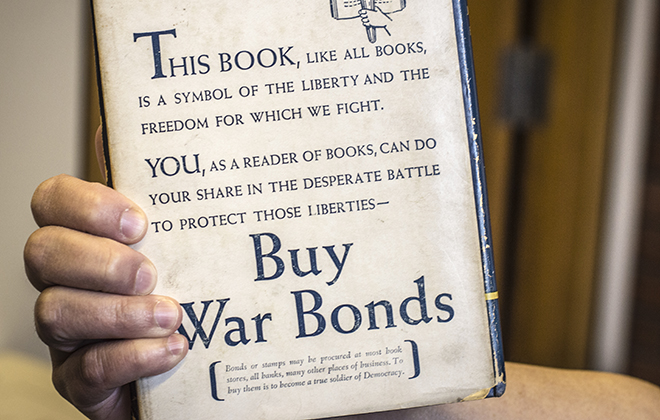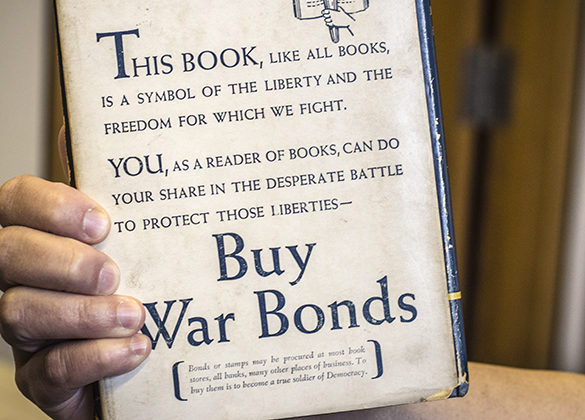While college students are no strangers to lugging around numerous amounts of heavy books to classes, it’s behind each professor’s door that a world of engaging and challenging literature might await.
Bookshelves reaching from the floor to the ceiling contain a wealth of knowledge students might never know. Take a look at these professors’ collections and step into their worlds.
Rob Brookey
Professor of Telecommunications & Director of the Digital Storytelling Masters Program
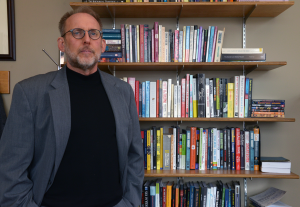
The Ultimate History of Video Games
by Steven Kent
From pinball to the Playstation 2, “The Ultimate History of Video Games” provides readers with an incredibly in-depth look at the first 25 years of the video game industry. Author Steven Kent, a contributor to publications like USA Today and The Japan Times, writes on such subjects as Pac-Man’s origin, Atari’s 2 million fall from grace and even rumors of a nationwide coin shortage in Japan brought on by “Space Invaders.”
“It really is kind of a go-to book,” says Brookey. “It even starts prior to pinball, talking about parlor games in gambling parlors, which really were the precursor to pinball, and then the precursor to the places that would house ‘Pong’.”
According to the book, early video game companies, like Atari, had an infamous corporate culture that included high levels of drug use and meetings held in hot tubs, similar to some powerhouse PC companies.
“It becomes very detailed,” says Brookey. “And it talks about the ways in which the video game industry kind of emerged with the personal computer industry in the late 70’s and early 80’s, and how those industries always had a significant overlap, both geographically and in terms of individuals. One of Steve Jobs’ first jobs was with Atari.”
Comic Wars
By Dan Raviv
“I just bought [‘Comic Wars’] because I thought it would be interesting,” says Brookey. “But it became very valuable to me when I began working on a chapter about the Marvel film video games.”
According to “Comic Wars,” Marvel Comics experienced a dangerous period of uncertainty during the mid-1990s. Two corporate “raiders” and two small-time Israeli businessmen with a passion for toys battled over the rights to properties like The Hulk and X-Men. The legal struggle would take nearly 10 years with plenty of tragic and hilarious twists.
“Out of this battle, what emerges is the Marvel Studios,” says Brookey, referring to the multimedia powerhouse that would go on to produce ‘The Avengers’, the third-highest grossing film of all time.
What can students learn from these books?
“The recognition that behind even what we imagine to be perhaps the most base forms of popular culture, there are sometimes billions of dollars at stake,” says Brookey. “That something like ‘The Fantastic Four’ operates as an intellectual property that people battle over, sometimes for almost a decade.”
Dr. Kevin Harrelson
Assistant Professor of Philosophy
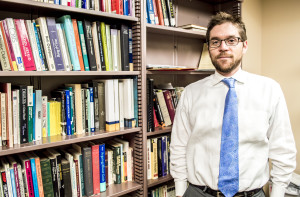
The Complete Works of Immanuel Kant
Friedrich Nietzsche and The History of German Philosophy
The dozens of volumes on Harrelson’s shelf, written by prolific authors like Friedrich Nietzsche and Arthur Schopenhauer, suggest that the world of philosophy is a vast one. Many times, these scores of books focus solely on one philosopher’s lifetime of critical thought and introspection.
Harrelson, who obtained many of his most treasured books while studying as a doctoral student in Germany, specializes in the history of philosophy. The centerpieces of his collection include rarities such as the first edition of Friedrich Ueberweg’s “Grundriss der Geschichte der Philosophie,” a German history of philosophy book published in 1896. Harrelson was lucky enough to find a small picture of the original author hidden in the book, an incredibly rare find given that photography was so uncommon in that time.
Harrelson also owns a 10-volume collection of Immanuel Kant’s work, as well as a 20-volume edition of Georg Wilhelm Friedrich Hegel, whose work Harrelson specializes in.
“[Friedrich Ueberweg’s ‘Grundriss’] is a rarity; something I paid a pretty penny for and found only in a used bookstore somewhere in Cologne,” says Harrelson, referring to one of his older texts. “But these days, thanks to technology, the same kind of thing is available in reprints through Amazon.”
What can students learn from these books?
“Book collections of this sort open up to a student a whole new realm of thought,” says Harrelson. “More importantly, I think, what students can glean from a collection like mine is that something like a book collection is really a record of your intellectual growth from a very young age.”
Harrelson not only collected books in his early college years, but also wrote in the margins of each page. “The margins in these books record my intellectual growth through my undergraduate years, graduate, [and] into my early years as a faculty member,” says Harrelson. “The notes in these books really are notes written by an 18-year-old or 19-year-old version of me. At any point I’m able to open one of these old books and see that there’s an entire world of thought that’s very foreign to where we begin. But we can see in the margins that I once inhabited that world. At least for a few hours or a few days.”
Dr. Ronald Groeber
Assistant Professor of Business Law

Denial
by Richard S. Tedlow
What causes companies like Coca-Cola to invent the financial flop known as “New Coke,” or Ford Motor Company to nearly go bankrupt over the color of their cars? Author Richard S. Tedlow explores the concept of denial, and how it infects even the highest-ranking leaders of global economic powerhouses.
“The type of denial that we’re talking about here is sometimes called ‘groupthink.’” You have a whole bunch of people who are believing something which is false, and acting on that. Eventually, it goes bad,” says Groeber.
Henry Ford, inventor of the Model T automobile, was infamous for telling his management team “Any customer can have a car painted any color he wants so long as it is black.” This, along with an increased demand for luxury models, which Ford wasn’t completely willing to facilitate, led to near bankruptcy for the company.
What can students learn from this book?
“In any sort of organization, there’s politics. And you’ve got to be careful not to step on people’s toes,” says Groeber. “If you’re in an organization in which there is groupthink, they’re going to be in denial. And anybody who brings this information to them, [they] will attack that person, and try to belittle him and destroy his [information].
Groeber says it’s something students need to be aware of, despite the fact that it’s hardly ever been taught.
“It’s not just simply I teach them what the business laws are,” says Groeber. “But it’s also teaching them how to think and how to deal with situations in which there is denial.”
Groeber says he appreciates a quote from Andrew Grove, former CEO of Intel.
“Only the paranoid survive.”
As dark as that may sound, Groeber says it reinforces the need for students of any major to be able to adapt and change in a highly competitive environment. Without it, you might just make the next New Coke.
Amy Edmonds
Bracken Library Music Librarian
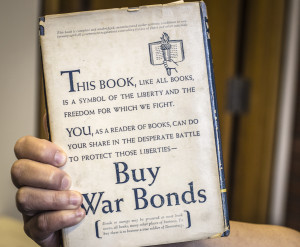
Little Men & Jo’s Boys
by Louisa May Alcott
“I started collecting books that were published in World War II,” says Edmonds. “Because I grew up in the house that my mother grew up in, and her books and her sister’s books were still in the house from when they were little girls.”
Edmonds noticed that in spite of being published the same year, in the same color, and by the same publisher, her copies of “Little Men” and “Jo’s Boys” were vastly different in size.
“It turned out the smaller one was published [during WWII], and there was a restriction on publishers on how much paper they could use,” says Edmonds. “Because nobody uses paper like the Pentagon.”
Edmonds then began searching for more books published under wartime restrictions.
Edmonds says she also found a number of wartime books that instructed readers how to cook with rations.
One of Edmond’s most prized wartime books is the complete works of Shakespeare, inscribed to a Women’s Army Corps member. In order to save paper, every time there would have been a short line, publishers shoved the next sentence wherever they could. This, Edmonds says, creates a weird situation where you can’t read Shakespeare’s work like a normal book.
What can students learn from these books?
Edmonds thinks it’s interesting to note that not only did wartime rationing affect food, water, and regular household items, but also the publishing industry. Though we may not ration our goods the same way in modern times, knowing just how far-reaching our government’s actions can be is critical.
Kevin Smith
Chairperson of the Department of History & Associate Professor of History
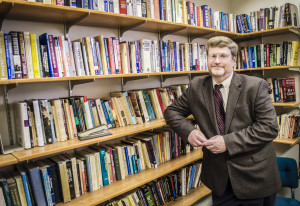
D-Day 1994
edited by Ted Wilson
Smith, whose personal library ranges around one thousand titles, not only has collected numerous books (spanning three separate collections) but also has contributed to a small number of them as well.
Smith lists “D-Day 1944,” edited by Ted Wilson, as one of his personal favorites. The editing staff, including Smith, met at the Eisenhower Library in Kansas in 1994, just a month before the 50th anniversary of D-Day. The staff included historians and veterans.
“The book is signed by the anti-Nazi commander of the 21st Panzers, Hans Von Luck, who was a subordinate of Rommel,” says Smith. “By the bagpiper [Bill Millin] who led the British commandos in on D-Day and took Pegasus Bridge [by] playing his bagpipes [and] Wally Strobel who was with the American parachuters.”
Beyond “D-Day 1994,” Smith has also contributed to a companion to D-Day, a companion to Franklin D. Roosevelt, and several others. Smith proudly displays his own book “Conflict Over Convoys: Anglo-American Logistics Diplomacy in the Second World War” between two Telly Awards for On-Air Segment Host and Senior Historical Consultant.
What can students learn from these books?
“I’ve devoted my life to, first of all, the pursuit and study of understanding the past,” says Smith. “It is important that I have and that students have a complicated understanding of war.”
Smith says that is especially the case with the recent conflict between Ukraine and Russia.
“War is both awful and occasionally necessary,” says Smith. “And it is important that people understand that war is never good, that war is Hell, that war is ugly, and that terrible things happen in war.”
Despite this solemn attitude, Smith takes it upon himself to personally thank any veteran he can for their service.
“I tell the story to my students, of going to the World War II memorial in Washington D.C. 10 years ago with my children,” says Smith. “We walked to the Vietnam memorial and I waited for a veteran there to finish his time at the wall with, obviously, a friend. When he stepped away and was clearly done, I went up and I thanked him. Until I have reason to believe otherwise, it is my responsibility to believe that a veteran of our armed services who served in combat did so honorably.”


